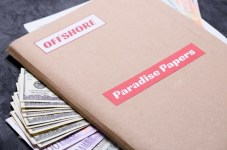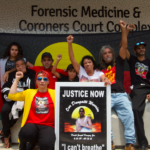There’s a Resounding Silence Over the Paradise Papers Revelations

The largest leak of financial information in history was made globally last week and the reaction has been lacklustre. The 13.4 million files that make up the Paradise Papers uncover the financial dealings of the ultra-rich and major corporations in offshore tax havens.
Most of the documents were derived from the Bermuda-based offshore law firm Appleby. Over half a million relate to deals made with Asiaciti Trust in Singapore, and the rest are from corporate registries in 19 tax havens.
The documents detail the offshore interests and tax avoidance measures of more than 120 politicians, and over 100 multinationals. Investments made by Queen Elizabeth II, the dealings of some of Trump’s cabinet ministers, and Russian investments in Facebook have all been laid bare.
German newspaper Süddeutsche Zeitung obtained the documents, and shared them with the International Consortium of Investigative Journalists (ICIJ). But unlike the Panama Papers these same entities released last year, the public response to the recent secrets divulged has been a fizzle.
Central American secrets
The Panama Papers consisted of 11 million files from the law firm Mossack Fonseca. They exposed the hidden investments of world leaders and heads of criminal organisations in shell companies and trust arrangements.
The revelations sparked protests in the streets of major cities around the world. In Pakistan, demonstrators threw rocks. While in Iceland, the reaction to disclosures about the offshore company then-president Sigmundur Davíð Gunnlaugsson’s owned, led to his resignation.
So, the lack of any formidable outcry from the majority of the world’s population about the information exposed regarding the tax avoidance practices of the global uber-rich is leading commentators to question what’s gone wrong.
Insubstantial mainstream coverage
It’s been suggested that the Paradise leaks haven’t resulted in mass public condemnations due to the dearth of reporting in the mainstream media.
Whilst there’s been heavy coverage by organisations directly involved in the ICIJ investigation, such as the Guardian and the Australian ABC, the story hasn’t received the same attention from other media outlets.
As outlined in the London Economic, British journalist James O’Brien put the lack of media coverage in the UK down to tax avoiders actually owning the newspapers. He pointed the finger at the owners of the Telegraph and the Daily Mail, as well as Times owner Rupert Murdoch, for silencing the story.
In Australia, Murdoch chairs the large media conglomerate News Corp. And much of the Paradise Papers coverage by News Corp in papers, such as the Australian and the Daily Telegraph, has focused upon the involvement of celebrities like Nicole Kidman, Michael Hutchence and John Ibrahim.
The absence of protests
Co-creator of Occupy Wall Street Micah White thinks that at the time of the Panama Papers release people took to the streets to protest in large numbers believing it would bring about substantial and long-lasting changes to the global economic system.
However, the activists that were protesting for change were subsequently “overshadowed,” as the “criminally rich,” who featured prominently in the Panama Papers, won firm victories in the Brexit vote and the Trump election, Mr White wrote in the Guardian.
And the reason the 99 percent are no longer demonstrating in public is that protests are becoming less effective due to growing wealth disparity. The very streets protesters take to are not the same streets the extremely rich occupy.
This growing disillusionment with the old form of protest, White states, is a positive, as now affirmative action can focus upon setting up a global legal system, involving an international criminal court that would prosecute “tax evasion as a crime against humanity.”
But most of this is lawful
The majority of people don’t have the option of investing billions of dollars in offshore tax havens. And as they ago about their daily business, the magnitude of what’s been revealed in the Paradise Papers is lost amongst the large figures.
While these offshore investments do hide illegal activities, such as money laundering and tax evasion, the reports stress that the majority of what is taking place is the legal avoidance of paying taxes. And when these practices are revealed to be lawful, many people lose concern.
However, when the tangible effects that legal tax avoidance by the ultra-rich is having on the rest of society are broken down, then the full implications of these backdoor systems fall into place.
Why we should care
Since 2015, the richest 1 percent has owned more than the rest of the world. And Oxfam estimates that these people are hiding $7.6 trillion in tax havens around the globe, and this would equate to $190 billion in taxes a year.
In Australia, the funnelling of wealth offshore to avoiding paying tax means that revenue that could be used to fund infrastructure, healthcare, public education and mental health services is missing from government coffers.
Currently, there’s an affordable housing crisis underway in Australia. There are rising numbers of people experiencing homelessness. Investment in public housing could ease this situation. However, those who can afford numerous properties are avoiding paying taxes that could fund more.
And these individuals and corporations that utilise legal loopholes to avoid paying tax still benefit from the tax funded services society has to offer them, including defence, emergency services and the criminal justice system.
The age of cynicism
But, another reason the Paradise Papers haven’t warranted the response of their predecessor is that the public is already aware of the extent of the deceptive monetary practices of the elite. And even before the Mossack Fonseca files became public knowledge people knew about offshore tax havens.
So, when the Panama Papers came to light, they confirmed what many already suspected was taking place. The initial outrage was caused by the concrete examples divulged, as well as the extent of them. Whereas, the secrets exposed in the current leak a year and a half later are hardly a surprise.
And this apathetic response is one of the critical effects of these tax haven practices. As the majority of people are forced to carry the burden of maintaining society, while the ultra-rich play free, the public is increasingly losing trust in social institutions, and the government that presides over them.








